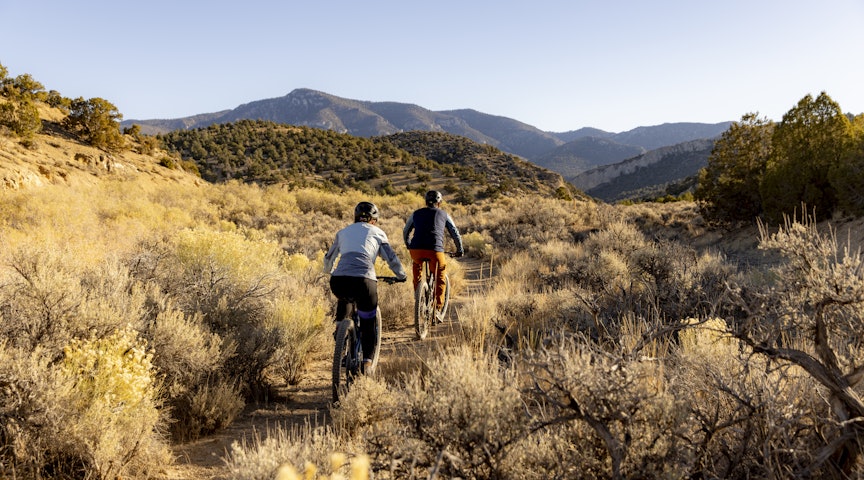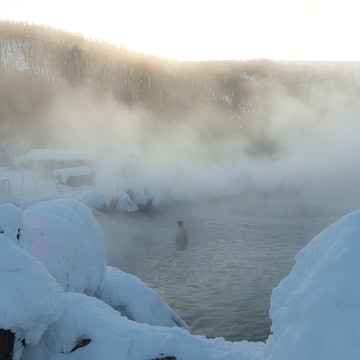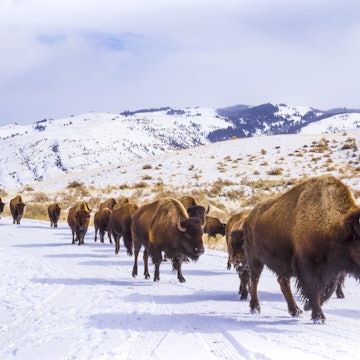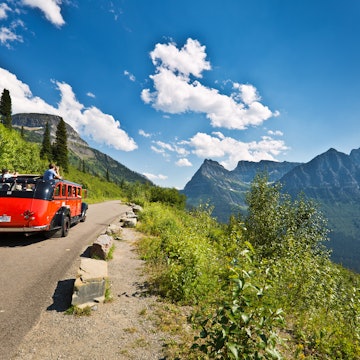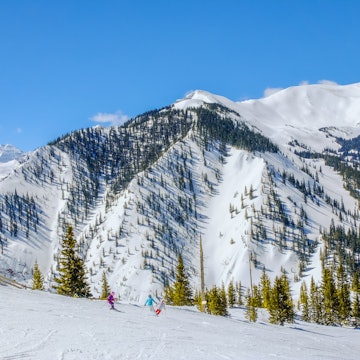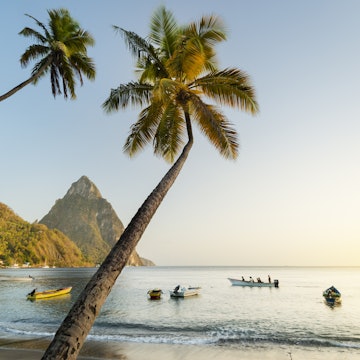

View from the top of Teton Pass. Tenley Thompson/Getty Images
Jackson Hole can be pricey, it is known as a celebrity hangout after all. But, you don’t need to have a Hollywood bank account to have a memorable visit. This Wyoming mountain town has a surprising number of budget-friendly lodging options and cheap things to do—especially if you enjoy outdoor adventures. It’s also a highly seasonal destination, meaning the cost of a vacation will be wildly different depending on which time of year you visit.
If you’re trying to do Jackson Hole on a budget, here’s what to know to save some cash.
Daily costs
Hostel room: $50-$120
Basic room for two: $150-$250
Self-catering apartment (including Airbnb): $300 per night
One-way ticket on public transportation: $1-$3
Single day lift ticket at a ski resort: $129-$269
Coffee: $3
Sandwich: $12
Dinner for two: $75
Beer/pint at the bar: $8
Average daily cost: $500 to $700
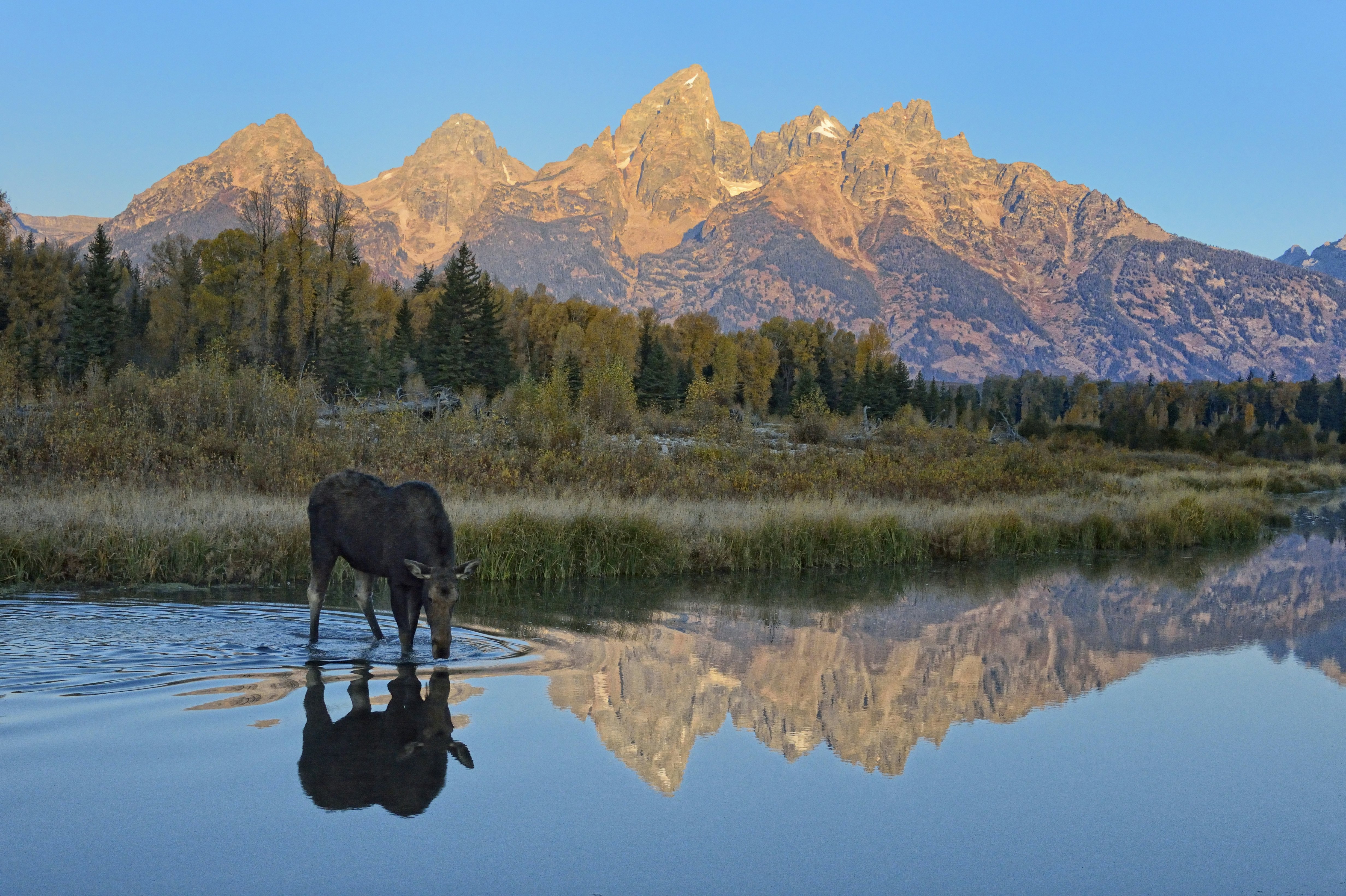
Visit during spring or fall
Jackson Hole has two main seasons for tourism: winter (for skiing and snowboarding) and summer (for hiking, mountain biking and other warm-weather adventures).
The obvious tip here is to visit in a shoulder season to save money and avoid crowds. In early spring, the mountains are still covered in snow and you may even be able to get in a few laps of spring skiing or enjoy snowshoeing in solitude. While there’s merit to that idea, the best part of this timing is wildlife-viewing. It’s a great season to catch baby animals as they are just starting to explore their new surroundings in Grand Teton and Yellowstone National Parks. Spring is also when birds are migrating and nesting, and as temperatures start to heat up in May, colorful wildflowers begin to emerge.
Autumn brings a kaleidoscope of color to Jackson Hole. Aspen leaves turn gold or, in some cases, red and orange. Animals are also active, either preparing for hibernation or searching for mates. (Elk rutting, or the sound bull elks make when calling for mates, is often loudest at sunrise and sunset, so grab a coffee, bundle up and head for an early morning hike catch this seasonal.)
One caveat: In both spring and fall, the weather can be unpredictable. But with the right layers, you can have plenty of outdoor fun—and save some money, too. On a chilly day, make the beautiful drive up to nearby Granite Hot Springs after a day of hiking. Buy a day pass ($12 for adults, $7 for children) and treat your legs to some hard-earned rest and recovery after a long day on the trail.

Invest in a national park pass
A day pass to Grand Teton National Park costs $20 to $35 (the price varies depending on your mode of transportation). If you’re planning to explore the park over several days or visit other national parks in the future—including nearby Yellowstone National Park—it probably makes more sense to buy an annual pass instead. You’ll pay $70 for an annual pass to Grand Teton National Park only, or $80 for an annual pass that gets you admission into all national parks, plus lots of other federally managed public lands.
Mark your calendar for free days
On specific days throughout the year, the National Park Service waives the admission fee at all national parks, including Grand Teton. (In 2024, there were six days like this.) The parks tend to be very busy on these free days, but if you don’t mind an early wake up you can likely catch a few quiet hours before the crowds build.
Shop for souvenirs at consignment and thrift shops
Jackson Hole is known for its many upscale shops and boutiques. Thrift and consignment shops offer a unique and off-beat opportunity to uncover some on-of-a-kind keepsakes. Pop into shops like Browse 'n Buy, Headwall Sports, Eclectic Consignment and Home Again to browse some eclectic finds.
Bunk with friends
Jackson Hole has several hostels, including Cache House, The Hostel, and Teton Hostel Hideaway, which offer a fresh take on what a budget stay looks like. Find amenities like communal eating and sitting areas, ski tuning, coffee counters and game rooms.
A handful of Jackson Hole hotels also have handy room configurations—bunk beds or family suites—that make it easy for groups to split costs while staying together in a private space. Check out Anvil Hotel, Mountain Modern, and The Virginian Lodge if you’re traveling with friends.
Sleep under the stars
If you’re well-versed in tent camping, Jackson Hole has no shortage of campgrounds, with nightly rates that are typically a lot lower than what you’d pay at a hotel.

If you don’t need services (and you’ve got a sturdy vehicle), you can also camp for free on public lands outside of developed campgrounds. Called “dispersed camping,” this option requires more flexibility and research, but you can’t beat the price. Platforms like iOverlander and Freecampsites.net can help you get started.
Skip the car rental
The costs of renting a car and parking can add up fast, especially if you’re staying for an extended period of time. Parking at Jackson Hole Mountain Resort, for example, can be as high as $45 per day during peak ski season.
If you’re flying to Jackson Hole, consider bypassing the rental car counter to save some cash. Not only do many Jackson Hole hotels offer free airport shuttles, but they also offer free ski shuttles (an especially nice perk if you’re not used to driving in the snow and ice). On top of that, downtown Jackson Hole is small and easy to navigate on foot or bicycle. The region also has a robust public transit network called Southern Teton Area Rapid Transit, or the START Bus for short. Rides are cheap, typically between $1-$3 each way.
Ski at Jackon Hole's other, smaller resort
Jackson Hole Mountain Resort is the most famous and largest ski resort in the region. But there’s also a lesser-known, more affordable option right downtown: Snow King Mountain. It’s smaller but no less fun, especially if you’re a beginner or traveling as a family. Kids 5 and under ski free, while daily lift tickets and lessons can be less than half the cost of those at Jackson Hole Mountain Resort.
Or, if you really want to save money, skip the ski resorts altogether. Winter activities that don’t require a lift ticket—like cross-country skiing, sledding, snowshoeing, and hiking—tend to be much easier on the wallet. Bradley and Taggart Lakes are wonderful options to check out on days you’re skipping the lift line.

Take advantage of season passes, discounts and deals
If you’re dead set on skiing at Jackson Hole Mountain Resort, there are some ways you can save a bit of cash. If you have a government-issued military ID, you can save up to 40% off lift tickets. If you have a current season pass to any other ski resort around the world, you can save up to 50% off your lift ticket on certain dates with the resort’s Golden Ticket offer. If someone you know has an Ikon Pass, they can also get you a friends and family voucher for up to 25% off.
If you plan on skiing a lot throughout the season, a multi-mountain pass like Ikon or Mountain Collective can also help you save money, especially for children 12 and under. Both of those options offer access to Jackson Hole Mountain Resort while Indy Pass holders can ski Snow King. These passes are more expensive upfront, but the broken down cost per day is often a better value than buying one-off lift tickets for the time you’re in town. The more you ski, the more value you get out of your pass.
Check out nearby public lands and wilderness areas
You have to pay to visit Jackson Hole’s nearby national parks, but there are also lots of other public lands and wilderness areas that don’t cost a dime, including the National Elk Refuge, Bridger-Teton National Forest, and Rendezvous Park. Jackson Hole also has lots of other free activities and attractions, including the Jackson National Fish Hatchery, the nightly Town Square shootout (summers only), public art and more.
Take your United States (USA) trip with Lonely Planet Journeys
Time to book that trip to United States (USA)
Lonely Planet Journeys takes you there with fully customizable trips to top destinations–all crafted by our local experts.
